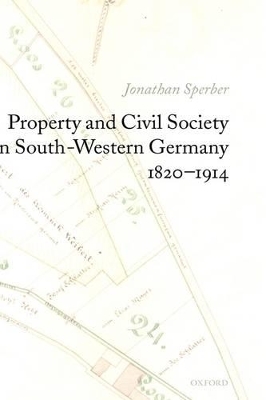
Property and Civil Society in South-Western Germany 1820-1914
Seiten
2005
Oxford University Press (Verlag)
978-0-19-928475-7 (ISBN)
Oxford University Press (Verlag)
978-0-19-928475-7 (ISBN)
A study of the uses of property in south-western Germany from 1820 to 1914. Based on documentation from civil court records, this book provides fresh insights into the nature of civil society, forms of social conflict, and the application of the law to everyday life.
Historians have often employed the concept of civil society, an intermediary realm between the family and the state, to analyse nineteenth-century Europe and North America. They have concentrated on voluntary associations, the press and public meetings, the constituent elements of Jürgen Habermas's 'public sphere', in doing so overlooking a central element of nineteenth-century civil society: property and its disposition, whether within the family or in the marketplace.
This book examines the place of property in the society of south-western Germany during property's nineteenth-century golden age. It analyses the culture of property ownership and property transactions within families, among business partners and competitors, and among creditors and debtors. The work considers the boundaries of property, outlining relationships between neighbouring property owners, and showing how property ownership helped shape social distinctions between men and women, Christians and Jews, the upper and lower classes, the sane and the insane, and between honourable and dishonourable actions. It traces the development of property relations and property transactions from the end of the Napoleonic era to the eve of the First World War. The book's conclusion compares conditions in south-western Germany with those elsewhere in Europe and North America, and considers changes in property relations occurring in Germany during the age of total war and in the post-1945 period in the light of structures and developments in the nineteenth century.
Based on extensive documentation from civil court records, Property and Civil Society in South-Western Germany presents its results through the recounting of intriguing, sometimes bizarre, but always revealing stories of legal disputes. A reconsideration of the nature of civil society, an analysis of nineteenth-century social development and social conflict, a study of the nature and action of the law in everyday life, the book is also an ironic and bemused look at the past human condition.
Historians have often employed the concept of civil society, an intermediary realm between the family and the state, to analyse nineteenth-century Europe and North America. They have concentrated on voluntary associations, the press and public meetings, the constituent elements of Jürgen Habermas's 'public sphere', in doing so overlooking a central element of nineteenth-century civil society: property and its disposition, whether within the family or in the marketplace.
This book examines the place of property in the society of south-western Germany during property's nineteenth-century golden age. It analyses the culture of property ownership and property transactions within families, among business partners and competitors, and among creditors and debtors. The work considers the boundaries of property, outlining relationships between neighbouring property owners, and showing how property ownership helped shape social distinctions between men and women, Christians and Jews, the upper and lower classes, the sane and the insane, and between honourable and dishonourable actions. It traces the development of property relations and property transactions from the end of the Napoleonic era to the eve of the First World War. The book's conclusion compares conditions in south-western Germany with those elsewhere in Europe and North America, and considers changes in property relations occurring in Germany during the age of total war and in the post-1945 period in the light of structures and developments in the nineteenth century.
Based on extensive documentation from civil court records, Property and Civil Society in South-Western Germany presents its results through the recounting of intriguing, sometimes bizarre, but always revealing stories of legal disputes. A reconsideration of the nature of civil society, an analysis of nineteenth-century social development and social conflict, a study of the nature and action of the law in everyday life, the book is also an ironic and bemused look at the past human condition.
Born in New York City, Jonathan Sperber was educated at Cornell University and the University of Chicago. He has taught at the University of Missouri for twenty years, and has been a fellow of the National Endowment for the Humanities, the Alexander von Humboldt-Stiftung, and the John Simon Guggenheim Memorial Foundation.
Introduction ; 1. Acquisition and Transmission ; 2. Transactions ; 3. Boundaries ; 4. Changes ; Conclusion ; Appendix ; Bibliography
| Erscheint lt. Verlag | 1.1.2006 |
|---|---|
| Zusatzinfo | 1 map, 4 tables |
| Verlagsort | Oxford |
| Sprache | englisch |
| Maße | 164 x 242 mm |
| Gewicht | 596 g |
| Themenwelt | Geschichte ► Allgemeine Geschichte ► Neuzeit (bis 1918) |
| Geisteswissenschaften ► Geschichte ► Regional- / Ländergeschichte | |
| Geschichte ► Teilgebiete der Geschichte ► Kulturgeschichte | |
| Geschichte ► Teilgebiete der Geschichte ► Sozialgeschichte | |
| ISBN-10 | 0-19-928475-X / 019928475X |
| ISBN-13 | 978-0-19-928475-7 / 9780199284757 |
| Zustand | Neuware |
| Haben Sie eine Frage zum Produkt? |
Mehr entdecken
aus dem Bereich
aus dem Bereich
Europa 1848/49 und der Kampf für eine neue Welt
Buch | Hardcover (2023)
DVA (Verlag)
48,00 €
Giordano Bruno - ein ketzerisches Leben
Buch | Hardcover (2024)
C.H.Beck (Verlag)
29,90 €


